Read about what our Clinician Scientist Fellows say
Sena Alptekin
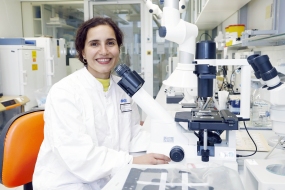
© dkfz.de
"Clonal hematopoiesis (CH) is a condition that develops in elderly individuals and relates to the outgrowth of mutant cell clones during the process of aging. Importantly, CH has been linked to increased risk of developing leukemia and other age-related conditions, like heart disease, stroke, and type 2 diabetes. More recently, a connection between CH and the development of some solid tumors has been identified. Hepatocellular carcinoma (HCC) is the most common form of liver cancer in Europe. Non-alcoholic fatty liver disease (NAFLD) is one of the major risk factors for HCC, and its prevalence is rapidly increasing in the Western world due to sedentary lifestyles and high-calorie diets. However, not all individuals with NAFLD progress to HCC. In our study, we have demonstrated that CH can both accelerate and increase the rate of conversion of diet-induced NAFLD to HCC and we aim to understand the mechanism through which this occurs. With the support of the DKFZ Clinician Scientist Fellowship, I have the opportunity to conduct my research in the lab of Dr. Michael Milsom, where I am able to work alongside experienced researchers and integrate my clinical experience with cutting-edge research. This setting allows me to advance my understanding of how conditions like clonal hematopoiesis contribute to hepatocellular carcinoma, ultimately translating these findings into potential therapeutic strategies that could directly benefit patients in the future."
Patrick Derigs
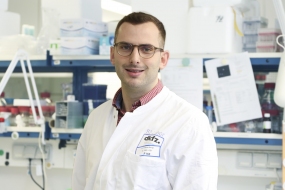
© dkfz.de
"The DKFZ Clinician Scientist Fellowship gives me the unique opportunity to perform cutting-edge translational research. As a clinician-scientist my motivation is to combine my clinical expertise with state of the art scientific knowledge to develop innovative treatment strategies for patients. By bridging the gap between the laboratory and the clinic, I want to improve gene and cell therapeutic approaches and hope to bring new treatments to patients with hematological disorders and cancer faster."
Kyrhatii Trikhirhisthit
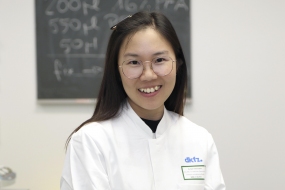
© dkfz.de
"Rectal cancer causes a lot of deaths worldwide. Normally, when the cancer hasn't spread, doctors treat it with surgery, chemotherapy, and radiation. But now, there's a new treatment which only uses chemotherapy and radiation. Some patients who respond really well to these treatments might not need surgery. My project aims to find small molecules in the cancer and its surrounding that can tell us how well treatments will work. I'll be using a tool called "Patient-Derived Organoids" or PDOs. These are tiny models of tumors grown in the lab from samples taken from patients. They act like real tumors and help us test different treatments to see which ones work best for each patient. By doing this, I hope to learn more about how to make treatments for rectal cancer better and personalize them for each patient."
Carina Nogueira Garcia
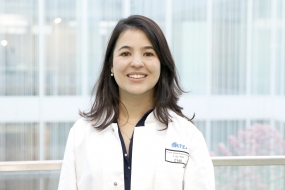
© dkfz.de
"Non-invasive technologies play a crucial role in the early diagnostics of skin cancer in dermatology, as they have the potential to significantly reduce morbidity and mortality rates among dermatological patients.
Our project explores explainable machine learning to provide dermatologists with valuable information such as tumor diagnostics, thickness and extension prior to the first excision. We also investigate the use of hyperspectral imaging for skin tumor detection through biological chromophore correlation.
The DKFZ Clinician Scientist Fellowship enables me to combine clinical knowledge and computer science in order to identify areas where these methods can be applied and how they can be integrated into clinical workflows."
Antonia Schubert
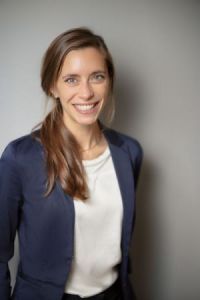
© dkfz.de
"In this translational research project, we will collect and archive blood samples of patients with solid tumors treated at the National Center for Tumor Diseases (NCT), Heidelberg. We will then isolate and thoroughly characterize the EVs at various stages of the disease and compare them to those of healthy individuals. We strive to identify novel biomarkers by aligning the patient's characteristics with the information gained through our EV analyses.
In this way, the DKFZ Clinician Scientist Fellowship allows me to study fundamental biological processes such as EV-mediated communication while integrating my findings in a meaningful clinical context."
We want to congratulate the DKFZ Fellow Dr. Antonia Schubert for receiving a project funding of the Else Kröner Fresenius Foundation in 2023.
Christina Nürnberg
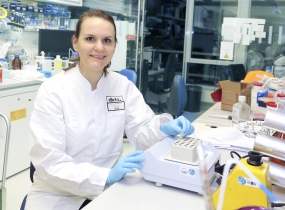
© dkfz.de
"The DKFZ Clinician Scientist Fellowship gives me the freedom to fully concentrate on the laboratory work of my training while benefiting from advice from experienced mentors in a nurturing environment. Even though through this project we are trying to answer basic questions, the potential findings could lead to promising new therapies for patients suffering from cancer."
Patrick Stelmach
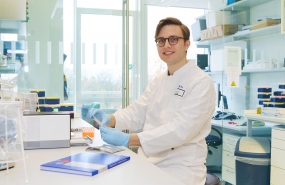
© dkfz.de
"The era of single-cell sequencing (single-cell multi-omics) and recently developed even more sophisticated approaches enable comprehensive analyses of single cells. This offers precious opportunities in the mentioned setting (rare CHIP clones) and my aim to use these methods in the lab of Professor Andreas Trumpp to study clonal hematopoiesis and the mechanisms of clonal expansion in stem cell samples of patients with Multiple Myeloma. I am convinced, that these cutting-edge methods will enable us to identify therapeutic vulnerabilities of these CH clones that may be of great interest in other hematological diseases as well."
Olfat Ahmad
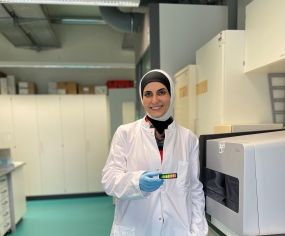
© dkfz.de
"Population genomic studies have allowed a better understanding of the diversity of genetic composition among different populations, together with the factors influencing it. Consanguinity is a key factor determining biological phenotypes of involved populations, namely the Near East, Middle East and North Africa. Constitutional Mismatch Repair Deficiency (CMMRD) is one of the inherited cancer predisposition syndromes that is prevalent in high consanguineous countries, and leads to characteristic phenotypic features, together with a distinguished spectrum of ultramutated CNS and other solid and hematological malignancies, whose driving molecular pathways and signatures have not been yet fully understood. I collected CMMRD tumors from my home country Jordan which has high consanguinity rate, and my research aims at better molecular understanding of MMR- associated phenotypes."
Voices of Former DKFZ Clinician Scientist Fellows
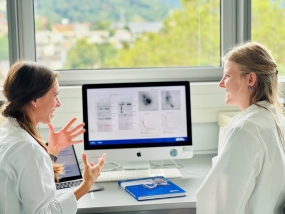
© dkfz.de
Are you curious aboth the experiences of former DKFZ Clinician Scientists Fellows?
If you want to know more about their time during the fellowship please click here to open/download a PDF Copy of their voices.
Clinician Scientist Fellowship Brochure
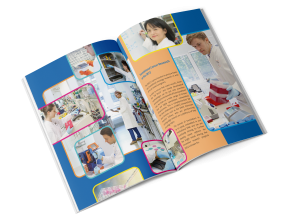
© dkfz.de
Are you interested to explore which cutting-edge research projects our fellows are working on at the DKFZ? Learn more about six of the DKFZ Clinician Scientist Fellows and about their motivation to be part of the DKFZ Clinician Scientist Program in our Fellows Brochure.
Click here to open/download a PDF copy of the brochure.
